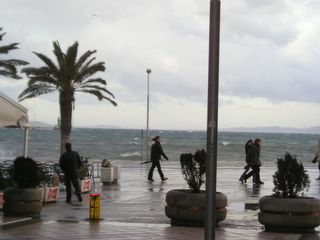Butchering Justice
Jadranka Kosor, minister of veterans' affairs in Sanader's government and failed presidential candidate, is the last person whose side I would take in a debate.
But when the debate is between her and justice minister Vesna Škare-Ožbolt (Vesna Skare Ozbolt) a.k.a. "Arm of Justice" a.k.a. "Keep Them on the Streets", than it is isn't surprising that I feel more sympathies towards embattled and increasingly marginalised Sanader's associate than towards a person responsible for disgraceful state of Croatian judiciary.
Reason why two women clashed is different approach towards some sensitive and painful issues related to 1991-95 war and ICTY. Although most Croatians associate that institution with Gotovina affair and tend to think of it as nothing more than a tool of anti-Croatian and pro-Serbian Western politicians, Hague Tribunal has actually put away some nasty Serbian characters with Croatian blood of their hands. This could happen to so-called "Vukovar Three" – three high-ranking former JNA officers responsible for the massacre of some 200 Croatian Army soldiers and civilians captured after the fall of Vukovar in November 1991.
Carla del Ponte, chief ICTY prosecutor, hinted at possibility that the Tribunal, as part of its exit strategy, turn prosecution of "Vukovar Three" to the courts in ex-Yugoslav republics, so they could be tried in Croatia or Serbia.
Škare-Ožbolt was very quick to advocate that "Vukovar Three" case be turned over to Croatian courts and that this should be official Croatian policy.
Kosor, on the other hand, diseented and said that it would be more appropriate for "Vukovar Three" to be tried in Hague.
Her argument is very simple and corresponds with my own thoughts on the matter. If "Vukovar Three" – or any suspected war criminal, for that matter – gets tried in Croatia or Serbia, the worst he would get is 20 years behind bars. This was the maximum prison sentence in former Yugoslavia in 1991, used as substitute for death penalty – abolished de iure in Croatia 1990 and de facto in Serbia in early 1990s. Both countries later ammended their penal codes allowing for much harsher prison sentences, but, due to constitutional principles, they can't apply it to crimes committed in 1991-95.
Statute of ICTY, on the other hand, allows for war criminals to be sentenced for life. Kosor was, therefore, right to point that the people responsible for worst atrocities shoudl face much stiffer (and more appropriate) punishmnet in Hague than in any ex-Yugoslav court, Croatian or Serbian.
On the other hand, Vesna Škare-Ožbolt, even while trying to mask her views with cheap nationalist slogans, is again showing her true colours and favours any solution that would allow murderers, rapists, drug dealers, war criminals and similar sorry excuses for human being to spend as little time behind bars as possible.

